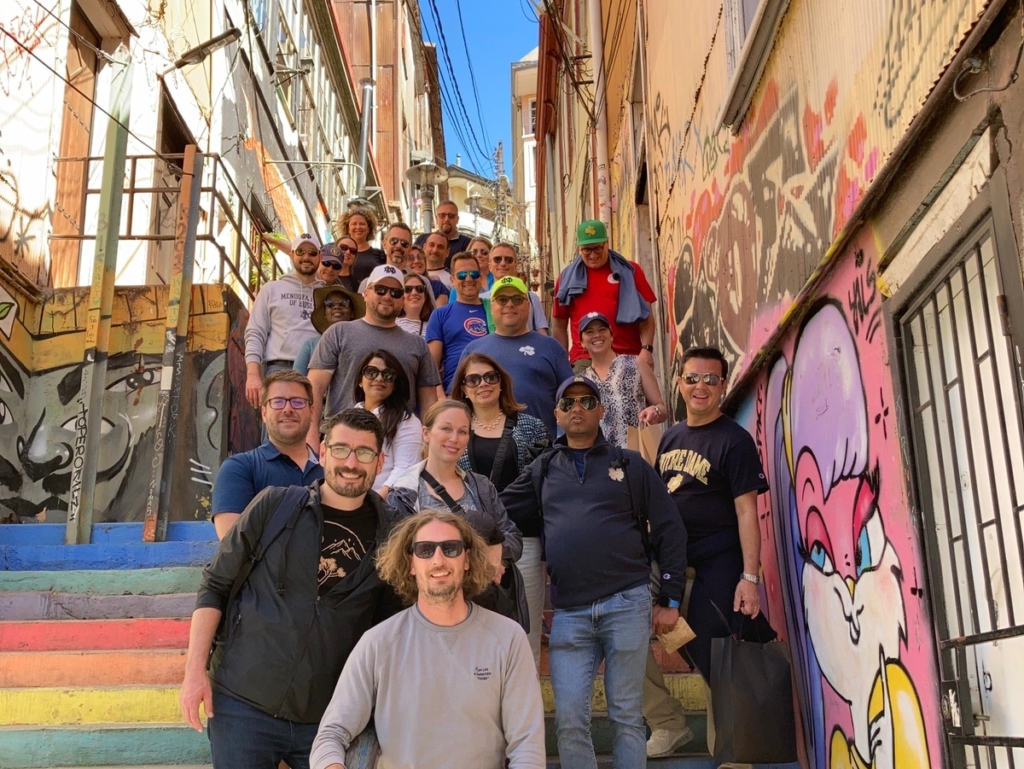
Mendoza College of Business EMBA students pose during their international immersion in Santiago, Chile. Mendoza is transforming its current EMBA offerings in South Bend and Chicago into a single Global EMBA cohort beginning in the fall of 2024. Courtesy photo
Even before University of Notre Dame’s Mendoza College of Business announced it was transforming its Executive MBA to one with a global focus, its residencies gave students valuable international exposure no matter their professional background.
Take Sarah Gallagher, 43. She’s worked in education throughout her career, serving some of the country’s most underserved communities. She’s been a teacher, instructional coach, principal, and a school district superintendent. Currently, she is CEO of Lighthouse Academics, a national network of charter schools.
In January, Gallagher traveled with her Class of 2023 cohort to Santiago, Chile. There, she and her classmates helped a small business build an international growth plan and assisted a non-profit expand its global donor base. In the process, they connected with a panel of local education, economics, and political experts to deepen their understanding.
“Given that so many companies have a global footprint, or will have a global footprint in the near future, the immersion experience has been invaluable for our class,” Gallagher tells Poets&Quants.
“It’s even become a hot topic for several classmates during recent interviews. Employers have been really drilling down on the extent to which candidates have had international business experiences, so it’s been great to have had this experience to draw on.”
A NEW GLOBAL FOCUS
Last month, Mendoza College of Business announced that it will launch a reimagined global Executive MBA next fall, closing its Chicago-based cohort after the Class of 2025. That will leave just the Global EMBA at its South Bend, Indiana, campus. Applications for the Global EMBA are now open.
The Global EMBA will follow the same curriculum and academic calendar of its current offering: a 22-month program in which students meet once per month for in-person residencies. But, global students will now have two required international immersions along with an option to participate in a third.
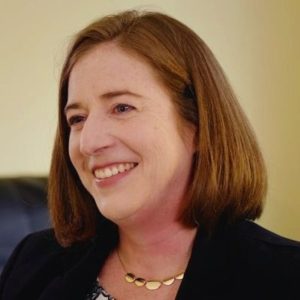
Sarah Gallagher, EMBA ’23
Gallagher decided to pursue an MBA after she was asked to step into her current role as CEO. She wanted a program that would give her a foundation in operations and finance while strengthening her business leadership skills. She wanted to expand her professional options, both in education and beyond, while staying true to her core values.
The mission of Mendoza’s EMBA is to create leaders who lead with integrity. Its Executive Integral Leadership (EIL) approach asks students to examine their strengths and weaknesses in several core areas to define what kind of leader they wish to be in each. This begins with a week-long immersion course at the start of the program. Beginning with the Class of 2026, the EIL will take place in the first international residency.
“EIL becomes the cornerstone, and it defines how students and staff interact with one another throughout the program,” Gallagher says. “It’s tough to describe just how impactful it is, and how much of it carries into who we become as leaders. It is truly transformative.”
MENDOZA EMBA SPOTLIGHT
When selecting her EMBA program, Gallagher knew she wasn’t just selecting a particular curriculum or a specific faculty. She was choosing a network: Classmate she would grow alongside and learn from in the program, and connect with throughout her career.
“I knew that the Mendoza program would look for people who were not only smart and successful, but who were also generous, supportive and wanted to ‘grow the good’ in business. I still routinely reach out to my former EMBA classmates to share problems of practice and to learn from their collective wisdom. This has been invaluable to me,” she says.
“Having celebrated more than half of my classmates as they received promotions and accepted phenomenal job offers over the course of the program, I know that both the MBA degree and the Notre Dame network will continue to be great assets in the future.”
Mendoza Global EMBA At A Glance |
||
| In fall 2024, Mendoza College of Business will launch its new Global EMBA, merging its South Bend and Chicago cohorts into one program for the Class of 2026. The cohort currently enrolled in the Chicago program (Class of 2025) will be the last at that location. | ||
| Length | 22 months | |
| Format | In-person classes one weekend per month (Thursdays through Saturdays) at Mendoza’s South Bend, Ind., campus | |
| Online/Hybrid Options | In certain circumstances, students can Zoom-in to the in-person class | |
| Residencies | Two international residencies required, one at the beginning and the other as part the capstone. Another international residency is optional as a summer elective. | |
| Academics | 50 credits; Students assigned to a study team of people from differing industries and backgrounds for multiple team based projects. | |
| GMAT, GRE, or EA | Not required, but may be requested to prove academic readiness | |
| Cost | $77,776 | |
University of Notre Dame’s Mendoza College of Business EMBA ranked 48th in Poets&Quants For Execs’ 2023 composite EMBA ranking of U.S. programs.
This week, as part of our EMBA Spotlight series, we’re exploring the program’s reimagined Global EMBA which will rollout for the Class of 2026. We spoke with Gianna Bern, the director of the Notre Dame Global EMBA, who has taught finance at Mendoza for 10 years. Our conversation, presented below, has been edited for length and clarity.
Let’s start with a brief history of the executive EMBA at Notre Dame.
Our EMBA has been in existence for 20-plus years, and it has evolved in many ways over that time. I was appointed as academic director two years ago, so I wear two hats: Both as academic director and as a professor of finance.
We now have a lot of what I like to call our rockstar, tenured faculty teaching in the EMBA program. We changed the program format to where students take three classes at a time over eight weeks, and all of a sudden I had faculty knocking on the door and asking to be involved.
Probably the single biggest change in the last 20 years is now our development into a more global program where we’re offering our students three opportunities to go abroad. And this is to help them develop leadership skills, business skills, and business problem solving in a global context.
What was the thinking and the discussions behind this move?
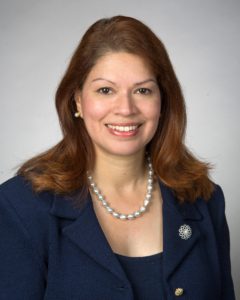
Gianna Bern, director of the Notre Dame Global EMBA
I think it was twofold: As an institution, part of the mission at Notre Dame is to provide a more global education for our students. What we’re doing in the Mendoza College of Business is making sure that our curriculum is in keeping with that. In our current EMBA program, students travel abroad once, in March of their second year, for their capstone. In our new global EMBA program, students will have the opportunity to travel abroad three times, each one for one week, to some location around the globe.
When we ask EMBA students – “What is the single most transformative experience that you’ve had with us?” – one of the common answers is the international, experiential learning and the cultural immersion from their trip.
As we started thinking about this over a year ago now, we wanted to build more of those experiences into our curriculum while also keeping with and furthering the university’s mission to be global. It was a meeting of the two worlds: the university’s mission of having a more global footprint and exposing students to more global experiential learning opportunities, as well as our own students telling us that it is something that’s really transformative.
Was more global experience something Mendoza EMBA candidates were looking for, in terms of their careers as well?
Absolutely. We hear over and over again that having international experience in the corporate world is some of the most difficult experience to obtain. Speaking for myself, I spent 20 plus years in global capital markets before coming to Notre Dame. I spent most of my career outside of the U.S., and it is very hard to get those global assignments. You have to be very senior, seasoned, sometimes you have to speak another language. Those are high hurdles to obtain in the corporate world.
We provide an opportunity for our students to solve problems in a global context. We have them working on projects with both a for-profit company and not-for-profit organization. Our students love it. It’s an intense week, but they truly get a lot out of that type of experience.
Our students come from every industry imaginable, and every industry today is global. There’s almost none that aren’t. Even many nonprofits have a global reach or global mission. Our goal is that when they graduate from Notre Dame Mendoza College of Business we’ve helped them build out their toolkit. It’s not only the finance, the marketing, the information technology, or the accounting, but global problem solving in a global context. Our hope with these international immersions is that they are learning how business is done in other countries.
Mendoza EMBA Class Profile |
|||
| Average Age | 37 | Financial Services | 15% |
| Average Work Experience | 15 years | Parma/Healthcare | 13% |
| % Women | 38% | Manufacturing | 11% |
| % Minority Students | 30% | ||
Notre Dame has what we call our gateway campuses where our undergraduate students, primarily, have the ability to go take classes in Santiago, Chile; Mumbai; Brazil; Mexico City, and other places around the globe in addition to places like Dublin, Rome, and London. As we started thinking about this, I said, “Why aren’t our EMBA students able to use these great facilities and opportunities for learning?”
Our dean, Martijn Cremers, and our senior associate dean, Craig Crossland, both concurred. So with the support of our dean’s office, we said now’s the time to make this happen.
Apart from the additional international immersions, are there other differences in the format, curriculum, etc., between the new Global EMBA and the program as it exists now?
In the traditional EMBA offering, the capstone is at the end of the 22 month program. The additional opportunities for international learning we are going to offer in the Global EMBA include one during their Executive Integral Leadership week, the very first week that they come to us. The global immersions will have different themes, and that first one will be leadership building and leading with intentionality. Our focus for our MBA is values-based leadership, so we attract students who are very focused on ethical and values based leadership. For that first week, right now we’re looking at Ireland.
The second opportunity for international travel will be during what we call our June electives week between year one and year two. During that week, we bring students back to campus where they take various electives. One of the choices will now be a class offered internationally.
We are thinking that could be to the Global South right now, but that has yet to be determined. That will be a good seven to 10 days abroad where students are, again, solving other problems, doing on the ground, hands-on consulting assignments.
The third opportunity for international learning will be the Capstone, which takes place in March of the second year. That will likely be in Santiago, Chile.
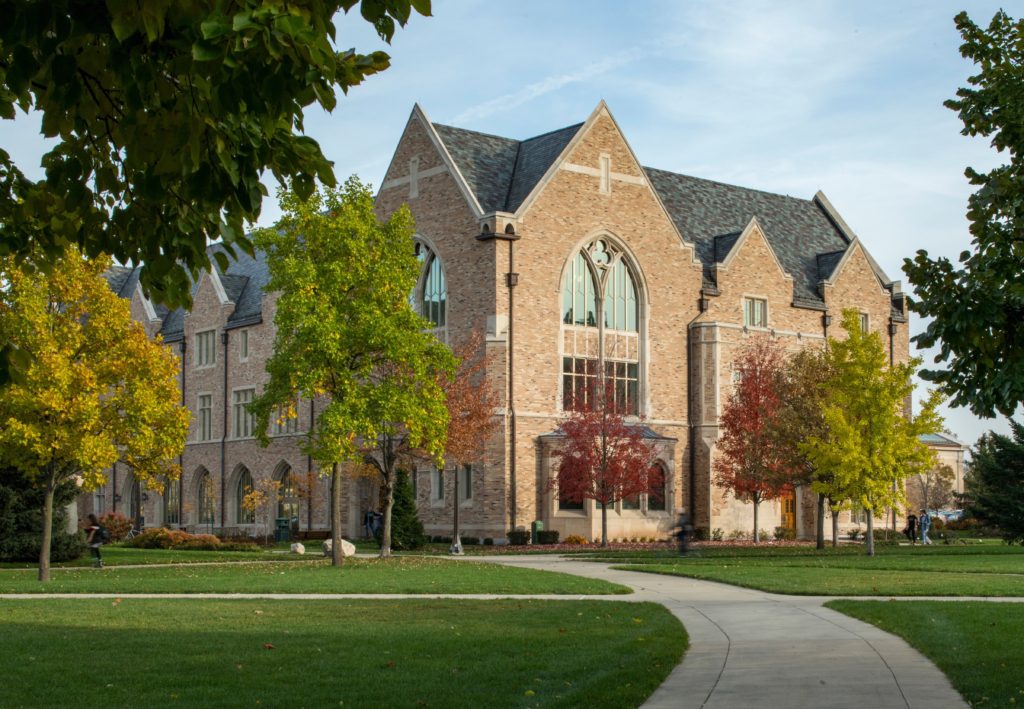
Stayer Center for Executive Education, Mendoza College of Business. Photo by Barbara Johnston/University of Notre Dame
How would you describe the differentiating mission and value proposition for the Mendoza EMBA?
The Mendoza EMBA is about values-based leadership. We want to build out that toolkit to give leaders of the future to lead with intentionality. It goes beyond the finance, the marketing, the accounting. When you look at our curriculum, the largest percentage of our classes are in what we like to call ethical-based leadership.
We do have a lot of finance – I teach global finance, in fact. We have the marketing classes, information technology, and analytics. We believe we offer a very well rounded program for mid level and C-suite executives to pivot or get them to the next level in their professional lives.
What curriculum innovations or additions have you made in the last few years that are worth highlighting?
We introduced corporate governance last year taught by John Busenbark, and we’re very excited about that. We just added Social Innovation with Professor Jeff Bernel, and that’s another class aimed at social entrepreneurship and growing businesses in challenged parts of the globe. Last year we created Digital Technology for Senior Leaders, taught by Professor Nick Berente. Even my class, the global finance class, 2020 was the first time it was offered. We’ve made a number of changes; We’re always looking to keep the curriculum fresh, relevant, and to help our students get to the next level.
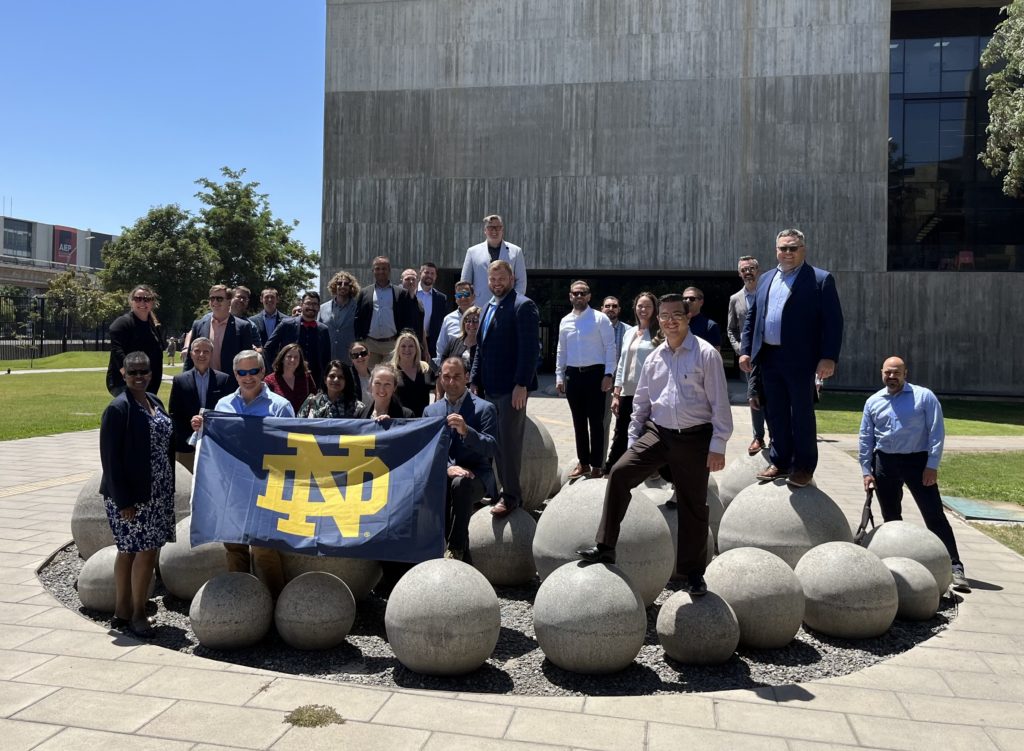
EMBA students during their immersion in Santiago, Chile. Courtesy photo
Have you explored online or hybrid options for students who may not be able to travel as readily?
Sure, and those are under serious consideration. Especially with offering three distinct weeks of international travel, we will definitely look for opportunities to offer some classes that will be live synchronous. The pandemic did teach us some lessons about these kinds of formats. We still use Zoom for office hours, and we use it widely during the week in between residencies for our students.
We also offer that for students who can’t get to campus for whatever reason. They can log in to their class remotely.
What have you noticed in enrollment trends, especially coming out of the pandemic?
We’re kind of back where we were, but I will say it is still a challenging economic environment. I talk to my colleagues in the EMBA Council (EMBAC), and everyone is feeling the effects of the higher interest rate environment and economic slowdown. I mean, if you look at EMBA students, some of them do rely on financing for their education because an EMBA degree has gotten very expensive at many institutions. In a rising interest rate environment, you’re now seeing it become very challenging for a lot of EMBAs, even for people that are well established in their careers.
What kind of opportunities are you seeing in this EMBA market?
I think well rounded leaders are still in demand. I’d say we strengthened our technology offering in recent years. With the big growth in data analytics and business analytics, we’ve strengthened our offering there as well.
DON’T MISS THESE STORIES IN OUR EMBA SPOTLIGHT SERIES:
- CAMBRIDGE JUDGE OFFERS MORE FLEXIBILITY WITH ITS NEW GLOBAL EMBA
- AFTER PANDEMIC PAUSE, WISCONSIN SCHOOL OF BUSINESS LAUNCHES NEW HYBRID EXECUTIVE MBA
- ASU CAREY’S EMBA OFFERS A LEADING CONCENTRATION IN THE BUSINESS OF HEALTH CARE
- TEXAS A&M UNIVERSITY’S MAYS BUSINESS SCHOOL EXECUTIVE MBA
- SCU LEAVEY’S EXECUTIVE MBA IN THE HEART OF SILICON VALLEY
- THE UNIVERSITY OF TEXAS AT AUSTIN MCCOMBS EXECUTIVE MBA
- UW FOSTER’S PROGRAM BRINGS STUDENTS TO SEATTLE’S TECH MECCA
- EMORY GOIZUETA’S PURSUIT OF FLEXIBILITY
- TCU NEELEY’S PROMISE: ‘ROI STARTS MONDAY’
- AT UMN CARLSON, A NEW CURRICULUM & HYBRID OPTION
- HOW CORNELL JOHNSON’S PROGRAM IS UNIQUELY SUITED TO THE MOMENT
- THE BENEFITS OF RUTGERS’ ACADEMIC-RUN EMBA POWERHOUSE





Questions about this article? Email us or leave a comment below.